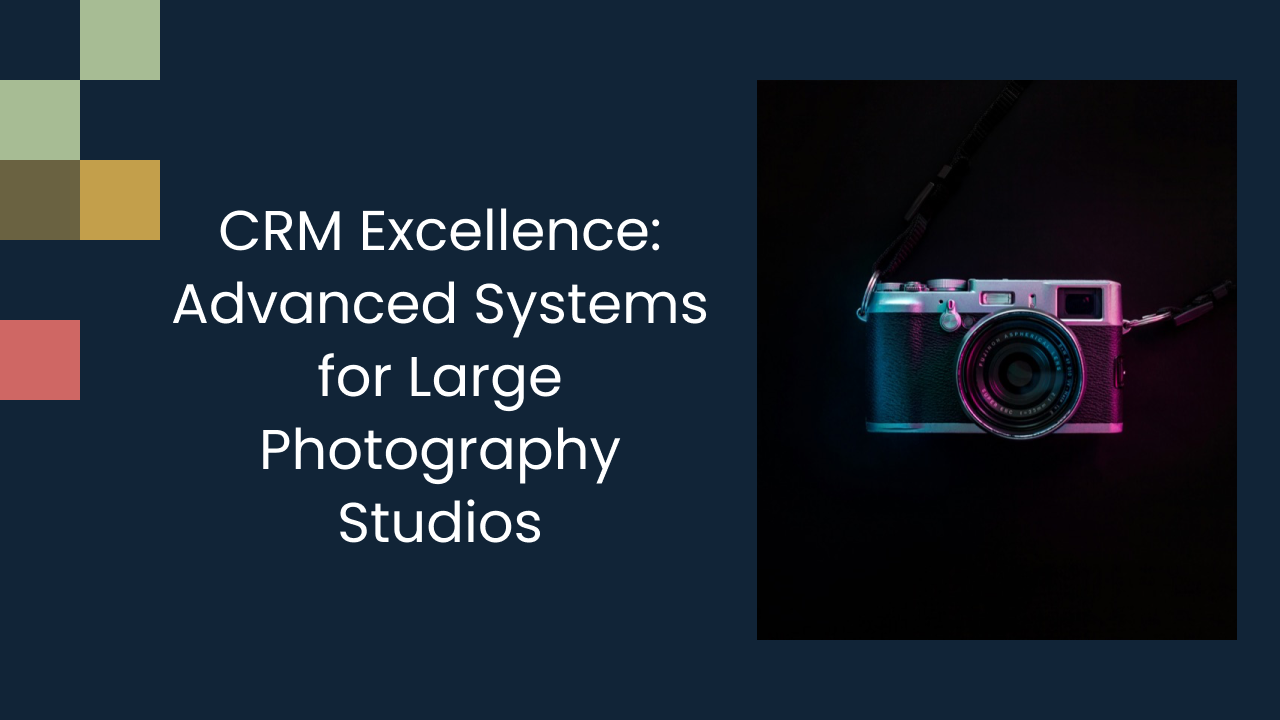CRM Excellence: Advanced Systems for Large Photography Studios

Customer Relationship Management (CRM) has become an essential tool for large photography studios, enabling them to streamline operations, enhance customer satisfaction, and ultimately drive business growth. In this article, we will explore the role of CRM in photography studios and discuss the importance of implementing the right CRM system for maximum benefits.
Understanding the Role of CRM in Photography Studios
Photography studios, especially those catering to a large clientele, need effective CRM systems to manage customer relationships efficiently. CRM helps studios maintain a comprehensive database of client information, including contact details, preferences, and transaction history.
This wealth of data allows studio owners and employees to personalize their interactions with clients, providing tailored services and ensuring customer satisfaction. Moreover, CRM helps studios stay organized by managing appointments, scheduling sessions, and tracking invoices and payments.
But let's dive deeper into the importance of customer relationship management and how CRM systems streamline studio operations.
The Importance of Customer Relationship Management
Implementing a CRM system is crucial for large photography studios due to the numerous benefits it offers. Firstly, CRM enables studios to build strong relationships with their clients, leading to increased loyalty and word-of-mouth recommendations.
Imagine a scenario where a studio has a client who has been using their services for years. With a CRM system in place, the studio can easily access the client's preferences and transaction history. Armed with this information, they can surprise the client with a personalized gift on their birthday or offer them a special discount on their favorite type of photography. These small gestures go a long way in fostering a sense of loyalty and making the client feel valued.
Secondly, CRM systems improve workflow efficiency by automating repetitive tasks, such as sending reminders, generating invoices, and managing inventory. This automation allows studio personnel to focus on the creative aspects of their work, ultimately leading to higher-quality outputs.
Imagine a studio that manually sends reminders to clients for upcoming appointments. This process is not only time-consuming but also prone to human error. With a CRM system, the studio can set up automated reminders that are sent to clients at the right time, ensuring that appointments are not missed. This not only saves time but also enhances the studio's professionalism and reliability.
Lastly, CRM equips studios with valuable insights into client preferences and behavior. Analyzing this data helps studios identify trends, understand which marketing strategies are yielding the best results, and make informed decisions for future campaigns.
For example, a photography studio may notice that a particular type of photography, such as newborn photography, is gaining popularity among their clients. Armed with this information, they can invest in training their photographers in this specific genre and tailor their marketing efforts to attract more clients interested in newborn photography. This data-driven approach ensures that the studio's resources are allocated effectively, resulting in a higher return on investment.
How CRM Systems Streamline Studio Operations
One of the key advantages of a CRM system is its ability to streamline studio operations. By centralizing client information and communication, CRM eliminates the need for multiple spreadsheets, post-it notes, and disparate tools. This centralization improves data accuracy, reduces redundancies, and saves precious time and effort for studio employees.
Imagine a studio where each employee maintains their own spreadsheet with client information. This not only leads to inconsistencies but also makes it difficult for other employees to access the information they need. With a CRM system, all client information is stored in one centralized location, ensuring that everyone has access to the most up-to-date and accurate data.
In addition, CRM systems facilitate effective team collaboration. They enable employees to access client information and update it in real-time, ensuring that everyone involved in a project is on the same page. This collaborative approach improves overall studio efficiency and minimizes the risk of miscommunication or missed opportunities.
For example, imagine a scenario where a client requests a last-minute change to their photo shoot location. Without a CRM system, this information may not reach all the relevant team members, resulting in confusion and potentially a missed opportunity to provide exceptional customer service. With a CRM system, the client's request is instantly updated in the system, and all team members involved in the project are notified, ensuring a seamless and coordinated response.
In conclusion, CRM systems play a vital role in photography studios by helping them build strong customer relationships, improving workflow efficiency, and streamlining studio operations. By leveraging the power of CRM, photography studios can enhance their overall customer experience and achieve long-term success in a competitive industry.
Evaluating the Best CRM Systems for Large Photography Studios
When choosing a CRM system for a large photography studio, it is essential to carefully assess various options based on specific requirements and desired outcomes. Let's explore the key features to look for in a CRM system and highlight some top-rated CRM systems suitable for large studios.
Key Features to Look for in a CRM System
- Customizability: A good CRM system should allow for customization to meet the specific needs of a photography studio. This includes custom fields, workflows, and reporting capabilities.
- Integration: The CRM system should seamlessly integrate with existing software and tools, such as accounting systems, email marketing platforms, and project management tools.
- Mobile Accessibility: In an increasingly mobile world, a CRM system should have mobile accessibility to enable studio personnel to access client information and perform essential tasks while on the go.
- Automation: Look for a CRM system that offers automation features to streamline repetitive tasks and workflows, such as email marketing campaigns, appointment reminders, and invoice generation.
- Analytics and Reporting: The ability to track and analyze data is crucial for studios to measure the effectiveness of their marketing efforts, identify trends, and make data-driven decisions.
Top-Rated CRM Systems for Large Studios
- PhotoforceCRM: Known for its user-friendly interface and robust features, PhotoforceCRM is a popular choice among large photography studios. It offers comprehensive client management, automated scheduling, and advanced reporting capabilities.
- StudioMaster: StudioMaster is another highly regarded CRM system designed specifically for photography studios. It enables seamless client communication, streamlines workflow management, and provides intuitive analytics for business insights.
- CaptureFlow: CaptureFlow is a versatile CRM system that offers powerful automation capabilities, including lead generation, contact management, and personalized email campaigns. Its integration with popular photography software makes it an excellent choice for large studios.
Implementing a CRM System in Your Photography Studio
Implementing a CRM system may seem daunting, but with proper planning and execution, it can be a smooth and rewarding process. Let's take a look at the essential steps for successful CRM implementation in a photography studio.
Steps to Successful CRM Implementation
- Define Objectives: Clearly identify the goals and objectives of implementing a CRM system. Whether it is streamlining operations, enhancing client relationships, or driving business growth, having a clear vision will guide the implementation process.
- Choose the Right System: As discussed earlier, carefully evaluate different CRM systems and choose the one that aligns best with the studio's specific needs and requirements.
- Training and Education: Ensure that all personnel who will be using the CRM system receive comprehensive training. This may involve workshops, online courses, or dedicated trainers to ensure proficiency and maximize system utilization.
- Data Migration: Properly migrating existing client data into the CRM system is crucial to maintain continuity and avoid data loss. Establish a smooth process for data extraction, cleansing, and import to ensure accuracy.
- Testing and Feedback: Conduct thorough testing of the CRM system before full implementation. Solicit feedback from employees and make necessary adjustments to fine-tune the system as per specific studio requirements.
- Continuous Improvement: CRM implementation is not a one-time task. Encourage continuous improvement by regularly reviewing workflows, identifying bottlenecks, and leveraging system updates and enhancements.
Overcoming Common Implementation Challenges
While implementing a CRM system can bring numerous benefits, it is essential to be aware of and address common challenges that may arise during the process. These challenges include resistance to change, data privacy concerns, and potential disruptions to current workflows.
To overcome these challenges, transparent communication and stakeholder involvement are crucial. Communicating the benefits of the CRM system, addressing concerns, and involving employees in the decision-making process will foster a positive mindset towards the implementation.
Maximizing the Benefits of Your CRM System
Having a CRM system in place is just the beginning. To fully leverage its benefits, it is important to focus on maximizing system utilization and ensuring ongoing efficiency.
Training Staff for CRM Proficiency
Investing in comprehensive training for all staff members using the CRM system is essential for optimal utilization. Continuous education, workshops, and creating a culture of learning will ensure that personnel are proficient and confident in utilizing CRM features.
Regular System Updates and Maintenance
Keeping the CRM system up-to-date with the latest software updates and enhancements is vital to ensure smooth functioning and access to new features. Additionally, regular system maintenance, such as data backups and performance optimization, is essential to safeguard valuable client information.
Measuring the Impact of CRM Systems on Studio Performance
An effective way to evaluate the success and impact of a CRM system is through key performance indicators (KPIs). These indicators help quantify results and identify areas for improvement.
Key Performance Indicators for CRM Success
- Customer Retention Rate: CRM systems aim to increase client loyalty. Measuring the customer retention rate helps understand the effectiveness of the CRM system in building lasting relationships.
- Conversion Rate: By tracking the conversion rate of leads into paying clients, studios can assess how well the CRM system is supporting their sales and marketing efforts.
- Client Satisfaction: Regularly surveying clients and tracking their satisfaction levels provides insights into the success of the CRM system in meeting their needs and expectations.
- Revenue Growth: Analyzing revenue growth over time can indicate the impact of the CRM system on business performance, as improved client relationships often translate to higher revenue.
Long-Term Benefits of CRM in Photography Studios
Implementing a CRM system provides significant long-term benefits for large photography studios. These benefits include improved customer satisfaction, increased client loyalty, enhanced workflow efficiency, and data-driven decision-making.
A well-implemented CRM system helps studios stay ahead in a competitive industry, enabling them to deliver exceptional customer experiences and achieve sustainable growth.
More from Pixifi











